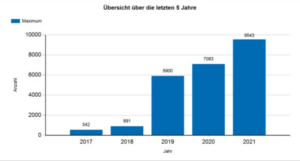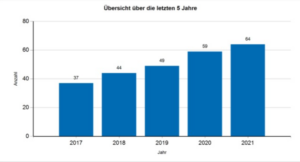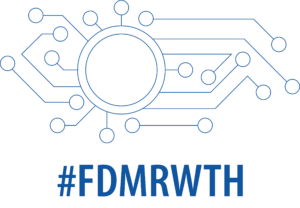
Source: Freepik
Three years ago, we provided insights into our RDM statistics on the RDM blog, and in the blog post RDM Statistics: 891 PIDs, we showed how the number of Persistent Identifiers had developed over the last few years up to 2018 at RWTH Aachen University.
But what about the PIDs three years later and to what extent does Coscine play a role in this? We addressed these questions in this blog post.
Persistent identifiers – PIDs for short – play an important role in research data management. With the help of PIDs, research data can be assigned a unique and permanent designation. This designation is helpful when research data are to be consistently cited or linked to metadata such as data producers or a publication resulting from them. A PID contains the information under which URL the data can be found. In addition, a URL can be specified under which descriptive metadata about the referenced data is stored.
The advantage of PIDs is that the information they contain remains valid even if the research data is moved to other storage locations. At RWTH Aachen University, PIDs are assigned in the form of DOIs (Digital Object Identifiers) and ePICs (European Persistent Identifier Consortium).
PID application examples can be found on our IT Center Help documentation portal. Instructions for PID application on Coscine in the form of ePICs can also be found on IT Center Help.
The trend is on rise
Even after three years, it can be stated that the use of Persistent Identifiers at RWTH Aachen University has risen sharply and continues to increase. While there were 891 PIDs in 2018, the number has increased to 9543 PIDs in 2021. This corresponds to an increase of approximately 971%.

Total number of PIDs
Source: “Quality and Performance Report, RDM Project, Research Data Management, May 2022”.
The same applies to the institutions using PIDs. While only 44 institutions used PIDs in 2018, this figure had already risen to 64 institutions by 2021. This corresponds to an increase of around 45%.

Number of institutes with PIDs
Source: “Quality and Performance Report, Project FDM, Research Data Management, May 2022”.
Coscine – The reason for the increase in PID use?
On the one hand, it can be assumed that researchers and their institutes have recognized the relevance of PIDs use and are increasing their use for this reason. On the other hand, the sharp increase in the number of PIDs issued is due to archive migration. In the course of the migration, archived research data is currently being migrated to Coscine. There, each archive node automatically receives a PID.
Learn more
If you would like to integrate the PID service into your application, you would like to learn more about the use of Persistent Identifiers or Coscine, simply contact the ServiceDesk. The RDM team looks forward to hearing from you.
For more information on the RDM, please also visit the RWTH web pages.
Don’t miss our online workshop on Coscine
An online workshop on Coscine will be held on October 19, 2022 from 10:00 am to 12:00 pm. The goal of the workshop is to be able to use Coscine efficiently for your research data management and thus fulfill important components of good scientific practice. Interested parties can use the following links to register. Please note that PhD students and postdocs register for the workshop via different links.
______
Responsible for the content of this article is Arlinda Ujkani.





Leave a Reply
You must be logged in to post a comment.